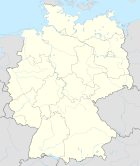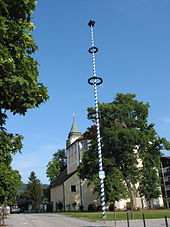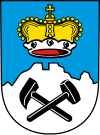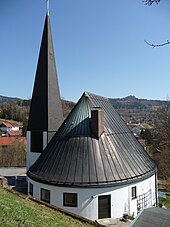Ground corn
| coat of arms | Germany map | |
|---|---|---|

|
Coordinates: 49 ° 4 ' N , 13 ° 6' E |
|
| Basic data | ||
| State : | Bavaria | |
| Administrative region : | Lower Bavaria | |
| County : | rain | |
| Height : | 689 m above sea level NHN | |
| Area : | 45.26 km 2 | |
| Residents: | 3562 (Dec. 31, 2019) | |
| Population density : | 79 inhabitants per km 2 | |
| Postal code : | 94249 | |
| Area code : | 09924 | |
| License plate : | REG, VIT | |
| Community key : | 09 2 76 117 | |
| LOCODE : | DE AIS | |
| Market structure: | 19 districts | |
Market administration address : |
Markt Bodenmais Bahnhofstr. 56 94249 Bodenmais |
|
| Website : | ||
| Mayor : | Joachim Haller ( CSU ) | |
| Location of the Bodenmais market in the Regen district | ||
Bodenmais is a market in the Lower Bavarian district of Regen and a climatic health resort . He is known, among other things, for his mine and the Silberberg .
geography
Geographical location
Bodenmais is located deep in the Bavarian Forest , southwest at the foot of the Großer Arber , the highest mountain in Bavaria outside the Alps .
Community structure
There are 19 districts:
|
history
Until the 18th century
The Bavarian Forest, located in the middle of the largest contiguous forest area in Germany, was mentioned early on in the history books. The area was cleared first by monks, then by a few settlers who settled in the jungle area. The first documentary report about Bodenmais is in the land register of the Bavarian dukes around the year 1300, in which the "item das Goldwerch ze Pabenmaiz" is reported. Around the middle of the 15th century, silver was dug in the pits near Bodenmais, called "God's Almighty Gift". Around 1485 the place received special privileges from the Bavarian Duke Albrecht IV. The great freedom letter of 1522 made the place a "Completely free mountain town " raised.
After the extraction of precious metals had declined, the mine switched to the production of vitriol in 1542 , which was then used to dye textiles. When it was converted into a Hofmark in 1580, the rights of the free mountain town were extinguished. From 1760, sales of vitriol stalled.
19th and 20th centuries
A new process of producing potée ( polishing red ), which was used to grind the glasses and polish the mirrors, allowed the factory to flourish between 1870 and 1914. Bodenmaiser Potée went all over the world. But the development of new chemical manufacturing processes soon meant that the company was no longer competitive. The last shift was on May 27, 1962.
After glassworks had settled in the Bodenmaiser area in the 15th century , Bodenmais became a glass refining center within 30 years after 1945 and offers the largest selection of lead crystals in Germany. Since no industry, apart from the major transport links, wanted to settle there, apart from the glass industry, tourism was recognized early on as an opportunity to earn a living. The origins go back to 1883, when the Bavarian Forest Association was founded in Bodenmais . After the war, tourism was further expanded and Bodenmais became the most famous and most visited health resort in the Bavarian Forest.
In 1945 Bodenmais was declared a climatic health resort and raised to the market in 1958. In 1962 the construction of a heated outdoor pool began, in 1967 the spa house was built, and in 1972 the indoor pool was put into operation.
In June 1976 there was a meeting with South Africa's President Balthazar Vorster on the initiative of US Secretary of State Henry Kissinger . In his company was u. a. Foreign Minister Hilgard Muller , Foreign State Secretary Brand Fourie and the boss of BOSS , Hendrik Van den Bergh. While regional representatives rated the event positively, the Federal Chancellor at the time feared that it would affect Germany's newly aligned Africa policy in international perception.
In 1989 the new town hall with spa administration, the underground car park and the spa gardens were completed. As a conclusion to the efforts of the place in the tourist area it received in December 1992 the predicate "climatic health resort".
Population development
Between 1988 and 2018 the market grew from 3,360 to 3,562 by 202 inhabitants or 6%.
- 1961: 3367 inhabitants
- 1970: 3291 inhabitants
- 1987: 3331 inhabitants
- 1991: 3503 inhabitants
- 1995: 3504 inhabitants
- 2000: 3466 inhabitants
- 2005: 3335 inhabitants
- 2010: 3338 inhabitants
- 2015: 3397 inhabitants
politics
Market council
The local elections of March 15, 2020 and earlier resulted in the following allocation of seats:
| CSU | Free voters | SPD | total | |
| 2020 | 7th | 6th | 3 | 16 |
| 2014 | 7th | 5 | 4th | 16 |
| 2008 | 7th | 4th | 5 | 16 |
mayor
- 1919 to 1933: Josef Weikl
- 1933 to 1945: Josef Eberhardt ( NSDAP )
- 1945: Josef Weikl
- 1946 to 1948: Johann Gürster (CSU)
- 1948 to 1952: Josef Weikl (independent, SPD supported)
- 1952 to 1956: Leopold Fleischmann (independent, SPD and Bavarian party supported)
- 1956 to 1990: Siegfried Weikl (CSU)
- 1990 to 2008: Fritz Wühr (CSU)
- 2008 to 2011: Michael Adam (SPD)
- since March 2012: Joachim Haller (CSU)
Finances
The municipality had a total of 6.999 million euros in debt in 2017. In 2014, the wage and income tax of the citizens of the municipality amounted to 6.830 million euros and sales of 127.672 million euros were generated.
coat of arms
Based on a corresponding resolution of the municipal council and the approval of the State Ministry of the Interior, as evidenced by a ministerial resolution of February 4, 1959, the municipality of Bodenmais bears the coat of arms described below.
| Blazon : “Divided by the outline of the Silberberg in blue and silver; above the golden Kurhut with silver ermine trimmings, below a crossed black mallet and a black miner's hammer. " | |
Culture and sights
- Catholic parish church : The Bodenmaiser church was built in 1804/05 in the middle of the market square in the direction of the Silberberg. In 1955/56 it was expanded by adding an octagon . The altar is decorated with a replica of the miraculous image of Loreto (a gift from the Elector), which was carried in a solemn procession from Maisried (Böbrach) to Bodenmais on June 16, 1705 (name day of St. Benno). As a reminder, every year there is a “handling” with a five-day folk festival in which the image of grace is carried.
- Historic visitor mine on the Silberberg : The silver mine has been open to interested visitors as a show mine since 1962 . In 1998, six former employees of the mine acquired the plant and the associated properties and have been operating it as a visitor mine ever since.
- Several glass-blowing factories: The largest and best-known is the Joska glass-blowing factory , which produces, among other things, trophies for winter sports.
- Old town hall with a special exhibition about the history of mining and the Vitriolhütte on the Silberberg as well as an exhibition about the singer Bernd Weikl .
statistics
In 2017 there were a total of 1,612 employees subject to social security contributions at the place of work, of which 441 were in the manufacturing sector, 750 in the trade, transport and hospitality sector and 85 with corporate service providers. This means that the number of inbound commuters was 328 higher than that of outbound commuters. In the main construction trade there were four companies with 44 employees in the same year. In 2016 there were 15 farms (eight of which were livestock farmers); An area of 301 ha was used for agriculture, of which 279 ha were permanent grassland.
To promote tourism, the Bodenmais Tourismus und Marketing GmbH (BTM) was founded in mid-2007 by the market town of Bodenmais and the Business and Tourism Association. 60% of the shares are held by the municipality, 40% by the association. Andreas Lambeck became the managing director of BTM. The business volume of Tourismus & Marketing GmbH was 2.6 million euros in 2009. In 2010, BTM's income was around 3.4 million euros.
Number of overnight stays
In June 2017, 126 overnight accommodations with 4,427 guest beds were open. The number of guest arrivals was 152,657 and 728,320 overnight stays were registered; the average length of stay was 4.8 days. This makes Bodenmais the leading tourist destination in the Regen district with a share of 30.5% in guest arrivals and 34.3% in overnight stays.
| year | Guest arrivals | Number of overnight stays | Overnight stays / guest |
|---|---|---|---|
| 1995 | 108,921 | 995.505 | 9.1 |
| 2000 | 110.282 | 854.880 | 7.8 |
| 2005 | 101.057 | 708.672 | 7.0 |
| 2010 | 147,895 | 865.120 | 5.9 |
| 2011 | 145.138 | 839.449 | 5.8 |
| 2012 | 147,468 | 839.825 | 5.7 |
| 2013 | 150,561 | 824.031 | 5.5 |
| 2014 | 143.104 | 752.871 | 5.3 |
traffic
Bodenmais is connected to the regional road network with the state roads 2132 Bad Kötzting – Zwiesel and 2136 Patersdorf – Bayerisch Eisenstein.
Bodenmais has been the terminus of the railway line from Zwiesel since 1928 . It is used every hour by the Länderbahn under the name Waldbahn . There are two stops in the municipality: Bodenmais and Böhmhof. A stop proposed by the Bavarian Railway Company and DB Station & Service Bodenmais Süd was rejected by the market council.
There are also bus routes operated by the companies RBO and Wenzel.
In addition to the in-house tariffs of the transport companies, the Bayerwald-Ticket is valid as a day ticket for the districts of Regen, Freyung-Grafenau and parts of the district of Cham on the bus and train lines mentioned above . Since December 1, 2015, the municipality's spa cards have been recognized as a guest service environmental ticket (GUTi) in the bus and train lines of the above districts.
education
In Bodenmais there are two day-care centers with 224 approved places and 216 supervised children (as of March 2018) as well as two public schools with 17 teachers and 197 students (school year 2017/18).
Individual evidence
- ↑ "Data 2" sheet, Statistical Report A1200C 202041 Population of the municipalities, districts and administrative districts 1st quarter 2020 (population based on the 2011 census) ( help ).
- ^ The Bayerwald messenger: Bodenmais: Joachim Haller (CSU) is the new mayor
- ↑ Bavarian State Library Online
- ^ The Withe House : Memorandum of Conversation . online at www.fordlibrarymuseum.gov (English)
- ↑ Wolfgang Becker: South Africa: "The Boers are afraid" . Spiegel article from June 28, 1976, online at www.spiegel.de
- ↑ Anonymous: Open doors . Spiegel article dated June 14, 1976, online at www.spiegel.de
- ^ SAIRR : A Survey of Race Relations in South Africa 1976 . Johannesburg 1977, pp. 406-407
- ↑ Local council election & mayoral election in Bodenmais 2020 - candidates & results. In: Wahl.info. Retrieved May 4, 2020 .
- ^ Siegfried Weikl - Bodenmais From mining village to climatic health resort
- ^ Entry on the Bodenmais coat of arms in the database of the House of Bavarian History
- ↑ Bernd Weikl, honorary citizen of Markt Bodenmais. In: buerger.bodenmais.de. Retrieved July 21, 2018 .
- ↑ State Statistical Office of Bavaria: "Monthly Survey in Tourism"















